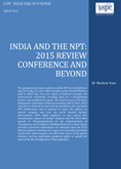"Ahmed Marwat: The Mysterious Militant Mastermind of Jundullah, Pakistan"
Ahmed Marwat: The Mysterious Militant Mastermind of Jundullah, Pakistan
Ahmed Marwat: The Mysterious Militant Mastermind of Jundullah, Pakistan
By Animesh Roul and Akanshya Shah, for The Global Intelligence.
http://theglobalintelligence.com/2015/06/29/tremors-in-the-himalayas/
While Chinese official statements classify the McMahon Line with India as an “Imperial Imposition’ and hence invalid, the same McMahon Line was utilized by China as the basis to delimit a section of the Sino-Burma border.
Ahead of the much-anticipated union elections in Myanmar towards October-November 2015, the Rohingya community in the country have been stripped of their franchise early this year in February following large scale protests by nationalist monks and political leaders. A referendum held to amend the Constitution that gave the Rohingyas voting rights, probably an initiative taken after surmounting international pressure, had to be revoked after the widespread protests that brought back horrific memories of the bloody 2012 clashes.
During the Asian-African Conference Commemoration Summit in Jakarta, the Indonesian president in his opening address put the record straight that "The view that the world economic problems can only be solved by the World Bank, the International Monetary Fund, and the Asian Development Bank is an out-dated view." One can hardly hear such a scathing attack from an incumbent leader against the financial-troikas in Asia.
On May 16 Prime Minister Narendra Modi would twit: ‘First Indian Prime Minister is visiting Mongolia after 60 years of our diplomatic relation’. If China is repositioning itself in the Silk Route (ancient India was a major link too) through larger economic thrust, India has to travel in the same breadth and length with the teachings and philosophy of Buddhism in North and East Asia, as Buddhism flourished prior to the Silk Route era.
ANIMESH ROUL, "Jamaat-Ud Daawa: Into the Mainstream": CTC SENTINEL, Volume 8 (4) April 2015. Published by Combating Terrorism Center, West Point, NY.https://www.ctc.usma.edu/posts/april-2015Published by Combating Terrorism Center, West Point, NY.
https://www.ctc.usma.edu/posts/april-2015
The decision to buy 36 Rafale fighters exposes the complexinstitutional mechanisms in defence procurement.

The quinquennial review conference of the NPT is to be held from April 27 to May 22, 2015. After the failure of the last NPT RevCon held in 2010 hope has once again re-surfaced amongst the international community, including India for a strengthened nuclear non-proliferation regime. The initial success of the three Preparatory Committee (PrepCom) meetings held in 2012, 2013 and 2014 is believed to have laid the foundation for successful NPT deliberations that is expected to reduce the salience on nuclear weapons and steer the world towards nuclear disarmament.
Since the Bharatiya Janata Party (BJP) led government came to power in India in 2014, the nomenclature of policies has been either Sanskritised or Indianised. With tech savvy Prime Minister on the steering wheel, the government is communicating with the general public through catchy one-liners that are quite apt for character-restricted social media like Twitter. Latest in this catchy pronouncement is the Foreign Secretary’s 'SAARC Yatra', as he rounded up tours of four neighbouring countries in the first week of March.
Paxton ported to drupal by DropThemes.in